大学生熬夜现象英语调查问卷
熬夜调查问卷模板

亲爱的同学:您好!为了解大学生熬夜的现状、原因以及影响,我们特此开展此次问卷调查。
本问卷采取匿名方式,所有数据仅用于学术研究,请您放心填写。
感谢您的支持与配合!一、基本信息1. 您的性别:A. 男B. 女C. 其他2. 您所在的年级:A. 大一B. 大二C. 大三D. 大四E. 研究生3. 您所在的学院:_______________二、熬夜情况4. 您每天晚上一般几点睡觉?A. 22:00之前B. 22:00-23:00C. 23:00-24:00D. 24:00之后5. 您每天的睡眠时间一般有多久?A. 6小时以下B. 6-8小时C. 8-10小时D. 10小时以上6. 您认为您的睡眠质量如何?A. 非常好B. 较好C. 一般D. 较差E. 非常差7. 您认为晚上几点才算是熬夜?A. 23:00B. 24:00C. 凌晨1:00D. 凌晨2:00E. 更晚三、熬夜原因8. 您通常什么时候熬夜?A. 学习压力B. 社交活动C. 娱乐休闲D. 个人兴趣爱好E. 其他(请注明):__________________9. 您熬夜的原因有哪些?(可多选)A. 学业压力B. 完成作业C. 参加社团活动D. 看剧、玩游戏E. 与朋友聚会F. 处理个人事务G. 其他(请注明):__________________四、熬夜影响10. 熬夜过后您的状态如何?A. 感觉良好,精力充沛B. 精神状态一般,略显疲惫C. 精神状态较差,感到困倦D. 身体不适,出现头痛、乏力等症状11. 如果熬夜之后对你产生了影响,第二天你会采取什么措施?A. 多休息,补充睡眠B. 服用提神药物C. 增加运动量D. 调整饮食E. 其他(请注明):__________________五、对熬夜的看法12. 您所了解到的熬夜有哪些危害吗?(可多选)A. 影响记忆力B. 降低免疫力C. 导致内分泌失调D. 加重心理压力E. 增加患心血管疾病的风险F. 其他(请注明):__________________13. 以下选项哪个最能反映您对熬夜的看法?A. 熬夜是必要的,可以提高学习效率B. 熬夜可以放松心情,但需适度C. 熬夜对身体健康有害,应尽量避免D. 熬夜是一种普遍现象,无需过度关注14. 您对熬夜持什么态度?A. 支持B. 反对C. 中立六、改善措施15. 您通常在睡前会做些什么?A. 学习B. 看剧、玩游戏C. 聊天、社交D. 听音乐、阅读E. 其他(请注明):__________________16.。
关于大学生熬夜的英语报告
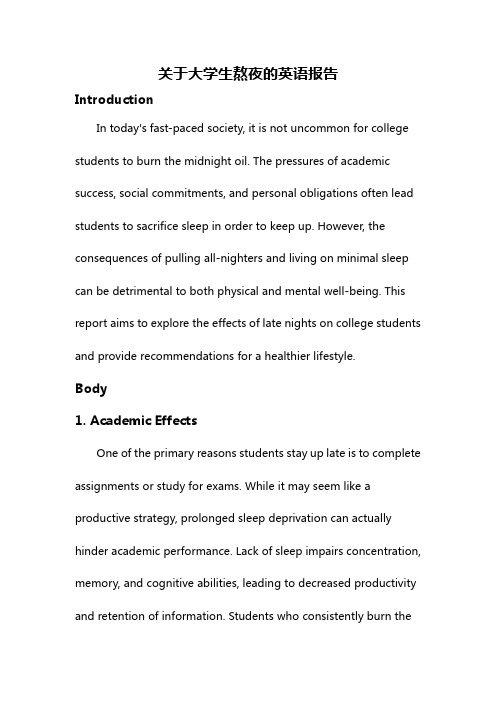
关于大学生熬夜的英语报告IntroductionIn today's fast-paced society, it is not uncommon for college students to burn the midnight oil. The pressures of academic success, social commitments, and personal obligations often lead students to sacrifice sleep in order to keep up. However, the consequences of pulling all-nighters and living on minimal sleep can be detrimental to both physical and mental well-being. This report aims to explore the effects of late nights on college students and provide recommendations for a healthier lifestyle.Body1. Academic EffectsOne of the primary reasons students stay up late is to complete assignments or study for exams. While it may seem like a productive strategy, prolonged sleep deprivation can actually hinder academic performance. Lack of sleep impairs concentration, memory, and cognitive abilities, leading to decreased productivity and retention of information. Students who consistently burn themidnight oil may find themselves struggling to understand complex concepts and achieving lower grades than theirwell-rested peers.2. Health ProblemsSleep deprivation not only affects academic performance but also has a significant impact on physical health. College students who frequently stay up late are at a higher risk of developing a variety of health problems. Chronic sleep deprivation weakens the immune system, making individuals more susceptible to illnesses such as colds and the flu. Additionally, it can lead to weight gain, hormonal imbalances, and an elevated risk of heart disease. Lack of sleep can also contribute to mental health issues such as anxiety and depression, exacerbating the already high levels of stress experienced by college students.3. Impaired Decision-making and JudgmentSleep-deprived individuals often exhibit impaireddecision-making and judgment skills. College students who sacrifice sleep to socialize or engage in late-night activities mayfind themselves making irrational choices that they would not have made in a well-rested state. Impaired judgment can lead to poor academic choices, risky behavior, and strained relationships. Moreover, lack of sleep increases the likelihood of accidents, both on and off-campus, as tired individuals have slower reaction times and reduced alertness.4. Tips for Healthy Sleep HabitsTo mitigate the negative effects of late nights, it is essential for college students to prioritize healthy sleep habits. Here are some tips to improve sleep quality:- Establish a consistent sleep schedule by going to bed and waking up at the same time every day, including weekends.- Create a sleep-friendly environment by ensuring the bedroom is dark, quiet, and at a comfortable temperature.- Avoid consuming caffeine, nicotine, and alcohol close to bedtime, as they can disrupt sleep patterns.- Incorporate relaxation techniques such as reading, listening to calming music, or taking a warm bath before bedtime.- Limit screen time, especially before going to bed, as the blue light emitted by electronic devices can interfere with melatonin production.By adopting these strategies, college students can promote better sleep hygiene and improve their overall well-being. ConclusionIn conclusion, the ramifications of late nights on college students are far-reaching. Sleep deprivation not only hampers academic performance but also poses serious threats to physical and mental health. It impairs decision-making and judgment, increasing the likelihood of making irrational choices and engaging in risky behavior. However, with the implementation of healthy sleep habits, college students can significantly reduce the negative impact of late nights on their lives. It is crucial for students to prioritize their well-being and recognize that a good night's sleep is essential for success.。
大学生熬夜情况调查问卷模板
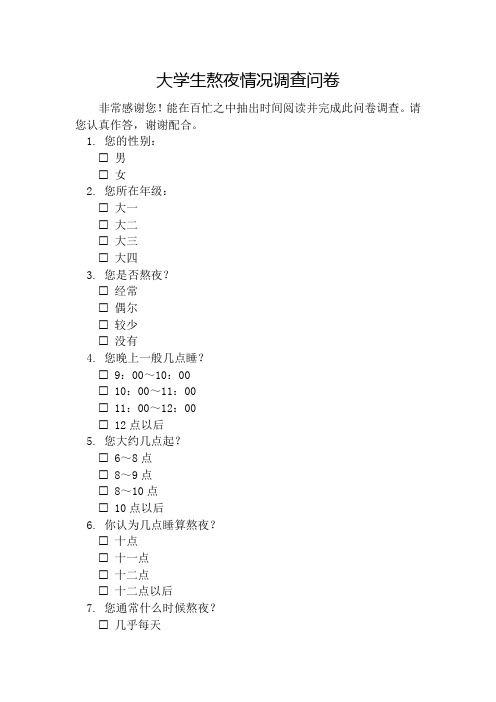
大学生熬夜情况调查问卷
非常感谢您!能在百忙之中抽出时间阅读并完成此问卷调查。
请您认真作答,谢谢配合。
1. 您的性别:
男
女
2. 您所在年级:
大一
大二
大三
大四
3. 您是否熬夜?
经常
偶尔
较少
没有
4. 您晚上一般几点睡?
9:00~10:00
10:00~11:00
11:00~12:00
12点以后
5. 您大约几点起?
6~8点
8~9点
8~10点
10点以后
6. 你认为几点睡算熬夜?
十点
十一点
十二点
十二点以后
7. 您通常什么时候熬夜?
几乎每天
周末或节假日
第二天没课或者课少
看心情
8. 熬夜的原因?
打游戏
刷视频,追剧
看小说
学习
习惯性
9. 熬夜的影响?
黑眼圈重
第二天无精打采很困
掉头发
起不来,上课迟到
其他
10. 与高中相比您现在的熬夜情况怎么样?
比之前更严重了
基本不变
比之前好了
11. 有没有想过不再熬夜?
有
没有
12. 有什么方法可以减少熬夜?
舍友互相监督
睡前不玩电子产品
宣传熬夜危害
其他
13. 如果熬夜对您的生活造成影响你会怎么做? 减少熬夜次数
加强锻炼
置之不理
其他
14. 您对大学生熬夜的建议或意见。
关于大学生熬夜情况的调查问卷
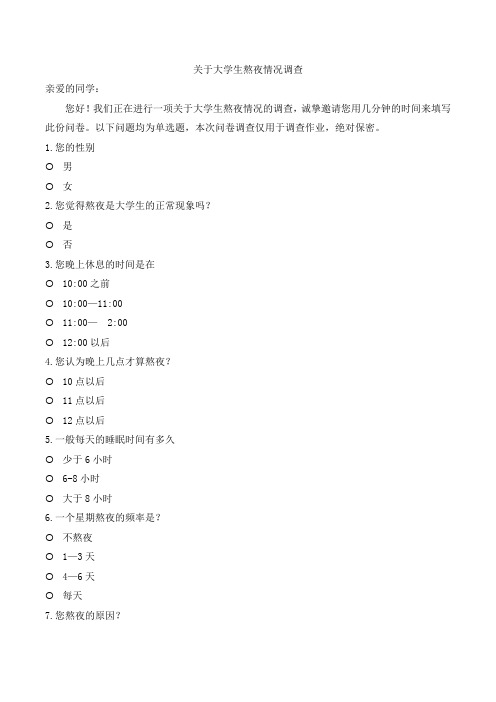
关于大学生熬夜情况调查
亲爱的同学:
您好!我们正在进行一项关于大学生熬夜情况的调查,诚挚邀请您用几分钟的时间来填写此份问卷。
以下问题均为单选题,本次问卷调查仅用于调查作业,绝对保密。
1.您的性别
男
女
2.您觉得熬夜是大学生的正常现象吗?
是
否
3.您晚上休息的时间是在
10:00之前
10:00—11:00
11:00—2:00
12:00以后
4.您认为晚上几点才算熬夜?
10点以后
11点以后
12点以后
5.一般每天的睡眠时间有多久
少于6小时
6-8小时
大于8小时
6.一个星期熬夜的频率是?
不熬夜
1—3天
4—6天
每天
7.您熬夜的原因?
学习
失眠
娱乐
其他
8.熬夜后的精神状态如何?
并无较大异常
略感疲惫
精神状态不佳
9.您是否认为熬夜对身体有极大危害? 完全认同
认同但继续熬夜
不认同
非常感谢您能抽出时间来填写这份问卷!。
大学生熬夜调查问卷
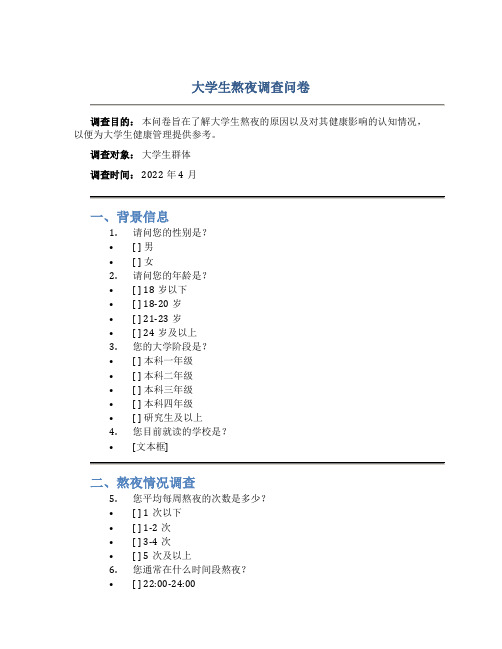
大学生熬夜调查问卷调查目的:本问卷旨在了解大学生熬夜的原因以及对其健康影响的认知情况,以便为大学生健康管理提供参考。
调查对象:大学生群体调查时间: 2022年4月一、背景信息1.请问您的性别是?•[ ] 男•[ ] 女2.请问您的年龄是?•[ ] 18岁以下•[ ] 18-20岁•[ ] 21-23岁•[ ] 24岁及以上3.您的大学阶段是?•[ ] 本科一年级•[ ] 本科二年级•[ ] 本科三年级•[ ] 本科四年级•[ ] 研究生及以上4.您目前就读的学校是?•[文本框]二、熬夜情况调查5.您平均每周熬夜的次数是多少?•[ ] 1次以下•[ ] 1-2次•[ ] 3-4次•[ ] 5次及以上6.您通常在什么时间段熬夜?•[ ] 22:00-24:00•[ ] 24:00-02:00•[ ] 02:00-04:00•[ ] 04:00及以上7.您熬夜的原因是什么?(可多选)•[ ] 学业压力大•[ ] 逃避现实问题•[ ] 娱乐活动(游戏、影视等)•[ ] 社交活动(聚会、夜店等)•[ ] 其他(请注明)8.您在熬夜过程中通常做什么?(可多选)•[ ] 学习•[ ] 网络娱乐(游戏、影视等)•[ ] 与朋友聊天•[ ] 进行社交媒体活动•[ ] 其他(请注明)三、对熬夜影响的认知9.对于熬夜对身体健康的影响,您有清楚的认知吗?•[ ] 是•[ ] 否10.您认为熬夜会对身体健康造成哪些不良影响?(可多选)•[ ] 精神疲劳•[ ] 免疫力下降•[ ] 头痛、头晕•[ ]偏头痛•[ ] 心理健康问题(焦虑、抑郁等)•[ ] 食欲不振•[ ] 其他(请注明)11.您对如何改善熬夜对身体健康的影响有何了解或建议?(请阐述)四、个人健康管理情况12.您每天的平均睡眠时间是多少?•[ ] 6小时以下•[ ] 6-8小时•[ ] 8-10小时•[ ] 10小时以上13.您是否有进行一定的体育锻炼?•[ ] 是•[ ] 否14.您平时的饮食习惯如何?•[ ] 健康均衡•[ ] 偏食或挑食•[ ] 垃圾食品较多15.您有参加其他健康管理活动吗?(如冥想、瑜伽等)•[ ] 是•[ ] 否五、其他问题与建议16.您在校期间遇到的其他身心健康问题有哪些?(请注明)17.您对大学生熬夜问题有何建议或想要了解的内容?(请阐述)非常感谢您参与本次调查!您的回答将为我们提供宝贵的数据和参考意见。
熬夜调查报告

Para 1
Recently we have carried out a survey in our school--- “Do you often stay up late at night?” The main findings are as follows: Half of the students surveyed keep late hours, with 45.4% sometimes burning the midnight oil, while only 4.65% of the students never stay up.
When did Liza go to bed? Why did she stay up? What will happen if she go on like this? What is Liza going to do after the conference?
Ella: You look awful. Have you stayed up late again? Liza: I went to bed at four. I have too much to do with a conference coming up. E: You must stop working around the clock! You are ruining your own health. to be going to L: What else can I do? I'm running out of time. happen very soon I have a bad headache, and coffee is 即将发生(或出现、 losing its effect on me. 到来) E: Get some rest. I think it will improve your concentration. I don't think you could go on like this. Remember the famous saying "early to bed and early to rise, makes a man healthy, wealthy and wise."
调查问卷模板大学生熬夜
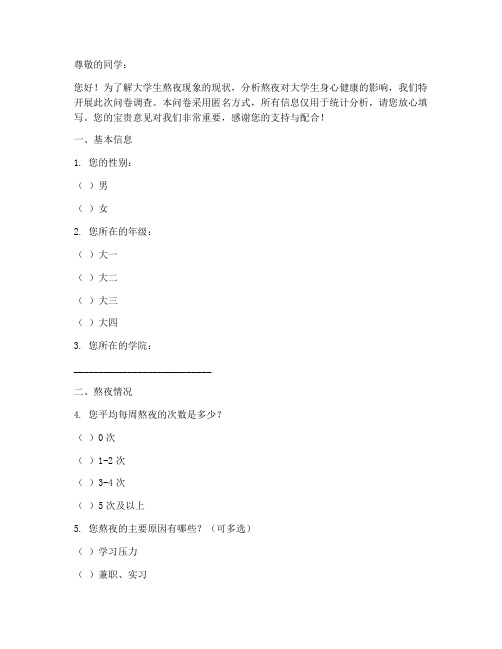
尊敬的同学:您好!为了解大学生熬夜现象的现状,分析熬夜对大学生身心健康的影响,我们特开展此次问卷调查。
本问卷采用匿名方式,所有信息仅用于统计分析,请您放心填写。
您的宝贵意见对我们非常重要,感谢您的支持与配合!一、基本信息1. 您的性别:()男()女2. 您所在的年级:()大一()大二()大三()大四3. 您所在的学院:____________________________二、熬夜情况4. 您平均每周熬夜的次数是多少?()0次()1-2次()3-4次()5次及以上5. 您熬夜的主要原因有哪些?(可多选)()学习压力()兼职、实习()社交活动()兴趣爱好()其他(请注明):____________________________ 6. 您通常熬夜的时间是?()晚上10点至11点()11点至12点()12点至凌晨1点()凌晨1点至凌晨2点()凌晨2点至凌晨3点()凌晨3点及以上7. 您熬夜后的状态如何?()精神饱满,效率高()精神不振,但能完成任务()精神不振,效率低下()无法完成任务,需要休息三、熬夜对身心健康的影响8. 您认为熬夜对您的身体健康有哪些影响?(可多选)()免疫力下降()视力下降()记忆力减退()消化系统问题()其他(请注明):____________________________ 9. 您认为熬夜对您的心理健康有哪些影响?(可多选)()情绪低落()焦虑()抑郁()其他(请注明):____________________________四、改善熬夜现象的建议10. 您认为学校在改善大学生熬夜现象方面可以采取哪些措施?(可多选)()加强心理健康教育()开设时间管理课程()调整作息时间表()提供更多娱乐活动()加强校园文化建设()其他(请注明):____________________________11. 您认为自己在改善熬夜现象方面可以做出哪些努力?(可多选)()调整作息时间()合理安排学习、工作、休息()提高自律能力()寻求心理支持()其他(请注明):____________________________感谢您抽出宝贵时间完成本次问卷调查!您的意见和建议对我们非常重要,我们将认真分析,为改善大学生熬夜现象提供有益参考。
大学生熬夜成为现状英语作文
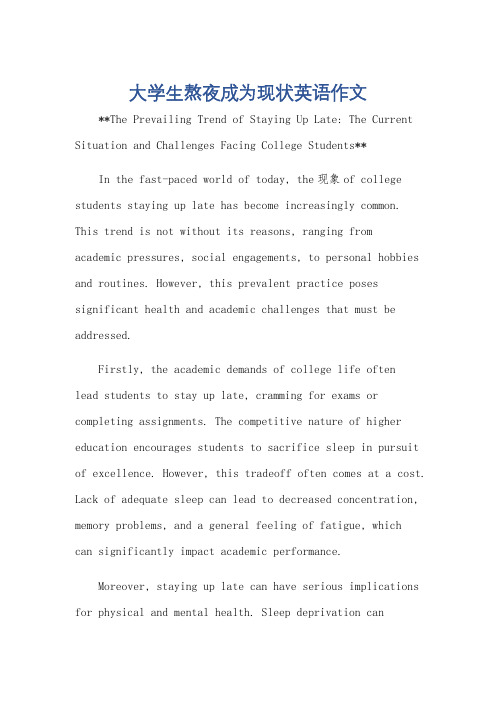
大学生熬夜成为现状英语作文**The Prevailing Trend of Staying Up Late: The Current Situation and Challenges Facing College Students**In the fast-paced world of today, the现象of college students staying up late has become increasingly common. This trend is not without its reasons, ranging from academic pressures, social engagements, to personal hobbies and routines. However, this prevalent practice poses significant health and academic challenges that must be addressed.Firstly, the academic demands of college life oftenlead students to stay up late, cramming for exams or completing assignments. The competitive nature of higher education encourages students to sacrifice sleep in pursuit of excellence. However, this tradeoff often comes at a cost. Lack of adequate sleep can lead to decreased concentration, memory problems, and a general feeling of fatigue, whichcan significantly impact academic performance.Moreover, staying up late can have serious implications for physical and mental health. Sleep deprivation canweaken the immune system, leading to frequent illnesses. It can also lead to mood swings, anxiety, and depression, as the body and mind are unable to recharge and rejuvenate. Long-term effects of chronic sleep deprivation can even include weight gain, heart disease, and diabetes.In addition to these health concerns, staying up late can also interfere with social and interpersonal relationships. Missing out on sleep can lead to a decrease in social engagement, as students find it difficult to maintain energy and enthusiasm for extracurricular activities. This can have a negative impact on their social skills and network, which are crucial for personal and professional development.To address these challenges, it is essential for college students to prioritize sleep and establish healthy sleep habits. This includes setting a regular sleep schedule, limiting exposure to screens before bedtime, and engaging in relaxing activities such as reading or meditation. Additionally, students should aim to balance their academic, social, and personal lives to avoid excessive stress and burnout.Furthermore, universities and colleges should also play a role in promoting healthy sleep habits among students. This could include providing education on the importance of sleep, offering counseling services for students facing stress and anxiety, and creating a campus environment that fosters a healthy work-life balance.In conclusion, while staying up late may seem like a necessary evil in the fast-paced world of college life, it is crucial for students to recognize its negative impacts on their health, academic performance, and social well-being. By prioritizing sleep and establishing healthy sleep habits, students can ensure that they are able to thrive both academically and personally during their college journey.**熬夜成风:大学生的现状与挑战**在当今快节奏的社会中,大学生熬夜已成为一种普遍现象。
- 1、下载文档前请自行甄别文档内容的完整性,平台不提供额外的编辑、内容补充、找答案等附加服务。
- 2、"仅部分预览"的文档,不可在线预览部分如存在完整性等问题,可反馈申请退款(可完整预览的文档不适用该条件!)。
- 3、如文档侵犯您的权益,请联系客服反馈,我们会尽快为您处理(人工客服工作时间:9:00-18:30)。
Questionnaire about th e Phenomenon of Undergraduates’
Staying up Late
1.Your gender:
A. Male
B. Female
2. Your grade:
A. Freshman
B. Sophomore
C. Junior
D. Senior
3. What time do you usually go to sleep?
A. Before 11:00 p.m.
B. Between11:00 p.m. to 1:00 a.m.
C. Between 1:00 a.m. to 3:00 a. m.
D. After 3:00 a.m.
4. How many hours do you sleep per day? (noontime snooze not included)
A. About five to six hours
B. About six to seven hours
C. About seven to eight hours
D. Above eight hours
5. In your opinion, what time is too late for sleep?
A.12:00 p.m.
B.1:00 a.m.
C. 2:00 a.m.
D. After 2:00 a.m.
6.The reasons that you stay up late are_______(multiple choice)
A. Uncompleted work or homework
B. Physical pain
C. Life pressure
D. Playing games, surfing on the internet or chatting with others
E. Coming back late at midnight
F. Roommates’ influence
G. Others
7. If you think your roommates affect your sleep, what measures would you take to settle the problem?(optional)
A. It does not matter to me
B. I’ll try to live with it
C. I’ll try to communicate with them
D. I’ll move out of the dormitory
E. Others (please specify)
_____________________________________________________________________
8. What happens after you take some measures? (optional)
A.It’s much better
B.It’s better but it doesn’t last long
C.The situation does not change at all
9. Have you ever found that someone else couldn’t sleep because you stayed up late?
A.Very often
B.Once in a while
C.Never
10. Have you ever tried to change the habit of staying up late?
A. Tried and didn’t succeed
B. Tried and succeeded
C. Wanted to, but didn’t try
D. Don’t want to
11. What’s your opinion about staying up late?
A. It’s a bad habit and harmful for health
B. Staying up late occasionally is ok
C. It depends
D. It’s not a bad habit and not harmful for health
12. What negative impacts do you know about staying up late? (Multiple choices)
A. Reduced efficiency of study
B. Deterioration of memory
C. Health damaged
D. Bad relations with roommates
E. Others
13. Concerning the issue of staying up late, what do you think that our university’s authority should do?
A. Disconnect electricity and the Internet at night
B. Strengthen the attendance system in morning classes
C. Improve dormitory’s access control system in the late night
D. Others
14. What’s your attitude towards university students’ staying up late and what would you suggest to prevent this from happening?
_____________________________________________________________________ _____________________________________________________________________。
